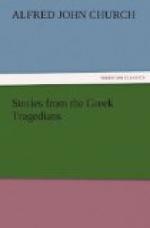So they brought the young men bound to the temple. Now the name of the one they knew, for they had heard his companion call to him, but the name of the other they knew not. And when Iphigenia saw them, she bade the people loose their bonds, for that being holy to the goddess they were free. And then—for she took the two for brothers—she asked them, saying, “Who is your mother, and your father, and your sister, if a sister you have? She will be bereaved of noble brothers this day. And whence come ye?”
To her Orestes answered, “What meanest thou, lady, by lamenting in this fashion over us? I hold it folly in him who must die that he should bemoan himself. Pity us not; we know what manner of sacrifices ye have in this land.”
“Tell me now, which of ye two is called Pylades?”
“Not I, but this my companion.”
“Of what city in the land of Greece are ye? And are ye brothers born of one mother?”
“Brothers we are, but in friendship, not in blood.”
“And what is thy name?”
“That I tell thee not. Thou hast power over my body, but not over my name.”
“Wilt thou not tell me thy country?”
And when he told her that his country was Argos, she asked him many things, as about Troy, and Helen, and Calchas the prophet, and Ulysses; and at last she said, “And Achilles, son of Thetis of the sea, is he yet alive?”
“He is dead, and his marriage that was made at Aulis is of no effect.”
“A false marriage it was, as some know full well.”
“Who art thou that inquirest thus about matters in Greece?”
[Illustration: Iphigenia and Orestes.]
“I am of the land of Greece, and was brought thence yet being a child. But there was a certain Agamemnon, son of Atreus, what of him?”
“I know not. Lady, leave all talk of him.”
“Say not so; but do me a pleasure, and tell me.”
“He is dead.”
“Woe is me! How died he?”
“What meaneth thy sorrow? Art thou of his kindred?”
“’Tis a pity to think how great he was, and now he hath perished.”
“He was slain in a most miserable fashion by a woman. But ask no more.”
“Only this one thing. Is his wife yet alive?”
“Nay; for the son whom she bare slew her, taking vengeance for his father.”
“A dreadful deed, but righteous withal.”
“Righteous indeed he is, but the Gods love him not.”
“And did the King leave any other child behind him?”
“One daughter, Electra by name.”
“And is his son yet alive?”
“He is alive, but no man more miserable.”




